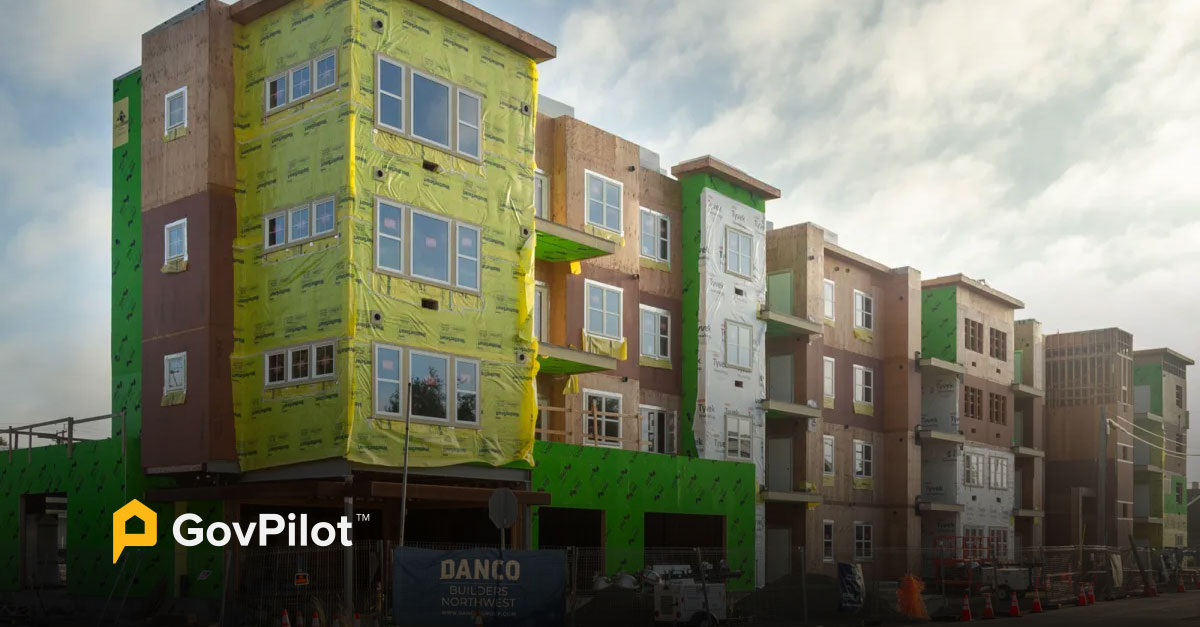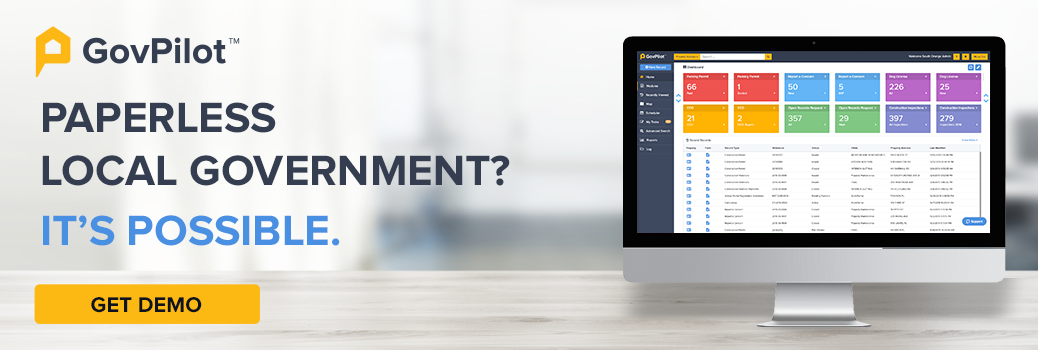New Jersey recently passed new legislation to expedite construction processes by codifying a 3 business day turnaround for inspections of affordable housing construction sites when an inspection is requested by the developer.
For many municipal & county construction department leaders, the thought of turning these inspections around quickly might sound challenging or downright impossible given your current inspection backlog and turnaround times.
In this guide, we’ll highlight the key attributes of NJ Bill A573 and explain how government technology and private sector partnerships can modernize your construction inspection workflows for affordable housing and beyond.
Even if your local government is not in New Jersey, it is likely that a similar law could already be in effect in your state, or potentially on the way. Read on to learn about this affordable housing construction law and see what it means for New Jersey municipalities and counties as well as out of state local governments.
What is NJ Bill A573?
NJ Bill A573 is 2023 legislation signed into law in January that is meant to expedite the amount of time it takes for local governments to inspect construction sites. The policy requires local government officials (or a private-sector inspector) to inspect an affordable housing construction project within 3 days of an inspection request.
The bill is focused on improving on existing slow-moving bureaucratic construction workflows in the Garden State. Read on for more specific insight into the new affordable housing inspection requirements.
What Policies Signed Into Law in NJ Bill A573 Pertain to Local Governments?
The 3-day affordable housing inspection bill press release perfectly sums up that the new legislation is meant to, “cut through bureaucratic red tape and expedite important inspections which will help spur [local economic development].”
Here is how Bill A573 modernizes New Jersey construction inspections for affordable housing with updates to the state’s Uniform Construction Code (UCC) Act:
3-Day Inspection Requirement
In order to expedite the construction process for crucial affordable housing for low-income residents across the state, the new update to the UCC specifies that, “a three-day construction inspection turnaround [is required] from the date of the requested inspection and allows for developers to contract with private on-site inspection agencies if local construction officials cannot complete the inspection within three days of the requested date.”
More specifically, here are the requirements for construction developers and the relevant government agencies to consider directly from the bill:
“The owner, agent, or other responsible person in charge of work shall notify the enforcing agency when the work is ready for any required inspection under the code. This notice shall be given in writing at least 24 hours prior to the date and time requested for the inspection. The enforcing agency shall perform an inspection within three business days of the date for which the inspection is requested.”
Here are Building Inspection Tips for Local Governments to consider.
Support in Modernizing Government Construction Inspection Processes
The state government recognizes that local governments have antiquated inspection processes that will be challenging to overcome overnight, and requires local governments to strategically plan around how they’ll complete inspections within three business days (or recruit private-sector partners to do so.)
“The bill… provides local governments with several avenues to improve their ability to conduct inspections in a timely manner, including a more streamlined bidding process to contract with private inspection agencies to conduct inspections for them or enter into shared services agreements to consolidate work among multiple municipalities.”
Your county / municipality can release requests for proposal and hire private inspection firms for your local government (or hire one inspector collectively with one contract for your community and other neighboring local governments.)
Here are the specific ways your local government can go about hiring a private-sector partner. “The rules and regulations shall allow an enforcing agency to:
- Enter into supplemental shared service agreements or contracts with a supplemental private on-site inspection agency to conduct on-site inspections for the purpose of meeting all required inspection timeframes;
- Enter into agreements with private on-site inspection agencies to conduct on-site inspections on a project-specific basis; and
- Authorize the owner, agent, or other authorized person in charge of work to directly contract with an authorized private on site inspection agency to perform all inspections on a project specific basis.”
Penalties for Not Hitting Affordable Housing Inspection Deadlines
The NJ Department of Community Affairs is now required, “to monitor the compliance of local enforcing agencies with 14 the provisions of the ‘State Uniform Construction Code Act,’ P.L.1975, c.217 (C.52:27D-119 et seq.), to order corrective action, or issue penalties, as may be necessary where a local enforcing agency is found to be failing to carry out its responsibilities under that act, to supplant or replace the local enforcing agency for a specific project, and to order it dissolved and replaced by the department where the local enforcing agency repeatedly or habitually fails to enforce the provisions of the ‘State Uniform Construction Code Act.’ This shall include the power to compel an enforcing agency to, within 15 business days, notify the department of any instance where the enforcing agency is unable to meet a deadline or other obligation imposed by law or regulation, and the power to order corrective action or issue penalties as may be necessary where an enforcing agency is unable to meet its obligations.”
Development Grants Awarded to 17 Affordable Housing Construction Projects
17 development projects received $19 million worth of grants for 79 units across the state for Affordable Housing Trust Fund Awards, HOME Community Housing Development Organizations (CHDO) Program, National Housing Trust Fund (HTF) projects. The full set of projects, developers, and the communities they’ve been approved in can be seen in the Office of the Governor Press Release about Bill A573.
The state also recently approved grants for the local public health departments. Learn more in the NJDOH Local Public Health Grants guide.
How Government Technology Can Modernize Construction Inspection Processes
Government construction inspections can run significantly more smoothly with municipal construction software. Here are some of the many benefits to making a digital transformation for building processes:
1. Digital Inspection Requests
Your local government has a 3 business day turnaround time for responding to affordable housing construction requests. Make your government scheduling processes substantially more efficient by moving inspection requests to your government website. Developers can quickly submit a request online and submit the required paperwork, and relevant government inspectors (or private inspection partners) will be automatically notified that an inspection is needed at a development project within your community.
Learn more about how forms and inspection requests work on an SEO / UX Optimized Government Website.
2. Online Bidding for Outsourcing Inspections
The bill clearly pushes local governments to outsource affordable housing construction inspections if they’re unable to make the 3-day turnaround times work with current constraints in their inspection processes. Your local government can publicly release requests for proposal (RFPs) via your government website, submit notifications to saved contacts from the private-sector inspection space, and receive bid submissions virtually. When your locality (and potentially other local governments you partnered with) select your ideal partner, you can submit a bid approval online to notify your partner of choice.
3. Digital Inspection Forms
To expedite the time it takes to complete an inspection, your local government can use the GovInspect digital inspection platform to document findings from your affordable housing inspections (and any inspection-type) virtually with customized inspection forms on a government tablet or phone.
Upon completion of the inspection, the documentation will be automatically stored in the government cloud and accessible to all relevant construction department employees. Whether the developer passed or failed the inspection, they can be virtually notified with
Other government inspections can be moved to government field devices too. Learn more about Retail Food Establishment Inspections and NJ Lead Paint Inspection Requirements for insight into how GovInspect can be customized to support various inspection-types across departments.
4. Cloud Storage of All Construction Records
Affordable housing inspection forms and all other construction document types can be virtually stored in the cloud for increased accessibility and cybersecure data back-ups. Whenever documentation is submitted by a government employee, private-sector partner, or developer, it will automatically be added to cloud, and can be found alongside all other property records for the site at hand via the local GIS map.
Learn more about the Benefits of Digital Public Record Management Technology and How to Keep Government Data Cybersecure.
5. Online Permit Applications and Approvals
Developers need to go through inspection processes to get permits for the affordable housing being constructed. The NJ Electronic Permit Inspection Law requires local governments to move their permitting processes to a digital capacity. Online construction permitting is another key feature of GovPilot’s construction software, meaning you can move all of your government processes pertaining to inspections, permitting, and beyond within one government software onboarding project.
Read on for more insight into How Digital Government Permitting Software Works.
Turning Affordable Housing Inspections Around in 3 Days
The New Jersey state government expects local governments to modernize their affordable housing inspection processes to stop the bureaucratic delays of critical housing projects that limit housing availability for low-income state residents and defer local economic development benefits that come with making more housing available.
Fortunately, local governments can abide by the new 3-day inspection turnaround times by modernizing inspection workflows with government software and recruiting private sector inspectors to complete inspections quickly.
To learn more about how GovPilot can digitally transform your construction department, book a free demo.
NJ Bill A573 FAQs
Why Did New Jersey Move to Improve Affordable Housing Inspections?
Phil Murphy signed the bill into law due to a recognition that slow-moving government inspection processes can delay the completion date for key affordable housing development projects; delaying access to critically needed housing and preventing local population growth from stimulating the municipal, county, and state economies.
What Can Local Governments Gain From Moving Construction Department Processes to a Digital Capacity?
Local government software can streamline government construction processes via public-sector digital transformation that poses the following benefits:
- Online permit and licensing applications and inspection requests along with online government fee processing.
- Mobile forms for inspectors to fill-in in the field.
- Online bidding for private-sector inspection partners and other construction contractors.
- Cloud-based storage of all property records across the community.
- Instant property record access directly from an intuitive 3D GIS map.










